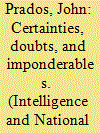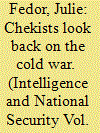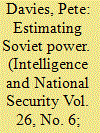| Srl | Item |
| 1 |
ID:
108723


|
|
|
|
|
| Publication |
2011.
|
| Summary/Abstract |
One way to explore the question of whether and how intelligence influenced the course of the Cold War is to review its impact within a defined arena of political-military activity. This paper investigates several areas in which intelligence analysis influenced the superpower strategic competition: forging of military doctrines, the design of weapons systems, and the progression of international crises. The analysis focuses on the United States case, where it finds cases in which US intelligence had beneficial effects but others in which intelligence performance proved more problematic in either shortening the Cold War or reducing its dangers.
|
|
|
|
|
|
|
|
|
|
|
|
|
|
|
|
| 2 |
ID:
108726


|
|
|
|
|
| Publication |
2011.
|
| Summary/Abstract |
This article examines conspiracy theories about the history of the Cold War as presented in post-Soviet memoirs and other writings produced by former KGB officers. It focuses in particular on conspiracy theories positing an ongoing Western plot to destroy and humiliate Russia. The article explores the connections which these texts draw between national identity, morality, memory, and state security.
|
|
|
|
|
|
|
|
|
|
|
|
|
|
|
|
| 3 |
ID:
108725


|
|
|
|
|
| Publication |
2011.
|
| Summary/Abstract |
A defining theme of defence intelligence in the UK during the early Cold War was the Service Departments' resistance to the concept of integrated intelligence. This article explains how this capability was achieved only with the amalgamation of the three Service Departments within a unified Ministry of Defence with overarching strategic and financial authority. It offers a critical analysis of the 1960 Templer review of Service intelligence, the creation of the Defence Intelligence Staff in April 1964, and its further restructuring on a functional basis in August 1965 by the Secretary of State, Denis Healey.
|
|
|
|
|
|
|
|
|
|
|
|
|
|
|
|
| 4 |
ID:
108722


|
|
|
|
|
| Publication |
2011.
|
| Summary/Abstract |
The study of the Cold War has undergone a significant transformation in recent years, with new critical perspectives, sources and debates. The nuclear history of the Cold War has begun to yield new insights on fundamental questions about the stability and dynamics of the confrontation. Recent evidence about the events of 1983 provides an opportunity to explore the risk of nuclear war and the role of misperception in Soviet-American relations during the 'Second Cold War'. Central to this is the study of intelligence. This article examines episodes in the autumn of 1983, notably the Able Archer 'crisis' of November 1983. Attention focuses on aspects of Soviet, American and British intelligence. Political and diplomatic consequences are also considered. A principal aim is to emphasize that we are at an early stage in researching and understanding events, and that a number of assumptions about the crisis require further exploration. Broader lessons about the role of intelligence in the Cold War are nevertheless explored and provisional conclusions reached about the performances of intelligence agencies and communities.
|
|
|
|
|
|
|
|
|
|
|
|
|
|
|
|
| 5 |
ID:
108724


|
|
|
|
|
| Publication |
2011.
|
| Summary/Abstract |
Intelligence's activities provoked feelings of threat in the adversary, and its capabilities provided reassurance for its own side. Fear of espionage (and associated covert action) was common to both sides. Intrusive technical collection had a similar effect, principally through the scale of Western operations around Soviet territory, and in overflights up to May 1960. On the other hand intelligence's capabilities provided reassurance for both sides in the mutually legitimized verification of the US-Soviet strategic arms control agreements. As the Cold War progressed they also increased Western governments' confidence that they would not be caught by a Soviet surprise attack, or by an overturning of the military balance of power. Yet for both sides the threat of the opponent's intelligence activities - the enemy within - remained the more important part of Cold War psychology.
|
|
|
|
|
|
|
|
|
|
|
|
|
|
|
|
| 6 |
ID:
108727


|
|
|
|
|
| Publication |
2011.
|
| Summary/Abstract |
Israel has been a target of Soviet intelligence collection since its independence in 1948. Operating out of the Soviet Embassy in Tel-Aviv, a large contingent of KGB case officers ran a string of agents deep inside Israel's security and diplomatic establishments. The article examines KGB human intelligence operations in Israel in the years 1948-67 and assesses the importance of diplomatic cover for effective human intelligence operations. Once diplomatic relations were severed, in 1967, the KGB lost much of its local capabilities and had to rely on 'illegal' case officers to run its agents in Israel, whose effectiveness was often compromised by Shabak double agent penetrations.
|
|
|
|
|
|
|
|
|
|
|
|
|
|
|
|
| 7 |
ID:
108728


|
|
|
|
|
| Publication |
2011.
|
| Summary/Abstract |
Western governments counted on intelligence's assessments of Soviet military power, present and future. Initially these were mixtures of accuracy and exaggeration, with important effects on policy. Intelligence's quality subsequently improved, and Western defence procurement was kept in some contact with reality. Something of this may have been true on the Soviet side, in its much easier task of studying Western power. On the more important assessment of Soviet intentions, by contrast, Western intelligence was never able to develop reliable sources at the centre of the Soviet regime, and its contributions were secondary and confirmatory; while Soviet intelligence for its part selected and presented reports to emphasize the received views of Western hostility and threats.
|
|
|
|
|
|
|
|
|
|
|
|
|
|
|
|